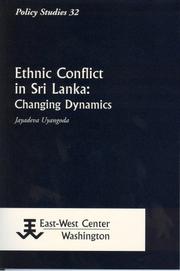Check nearby libraries
Buy this book

Sri Lanka’s ethnic conflict has become protracted and intractable. The twenty-five- year-old civil war has been interrupted numerous times for a negotiated peace and political settlement, yet the conflict has defied deescalation. All failed attempts at negotiated peace have propelled the civil war forward with greater vitality and intensity. Both war and “peace” appear to be mutually sustaining dimensions of a single process of conflict produced and sustained by two defining dynamics: (1) intense competition for state power between state-seeking minority nationalism and state-asserting majority nationalism; and (2) the fact that the “ethnic war” has acquired relative autonomy from the political process of the “ethnic conflict.” Against this backdrop, attempts at negotiated settlement, with or without ceasefires, have not only failed but have redefined the conflict. This study suggests that early deescalation or a long-term settlement is not possible at present. A protracted conflict requires a protracted process of political transformation. Since the question of state power is at the core of the conflict, a credible short-term path to peace should begin with negotiations that aim at, and lead to, reconstituting state power along ethnic lines. This will require a grand ethnic compromise among Sinhalese, Tamil, and Muslim elites, backed by the people in the three main ethnic formations. Sri Lanka’s ethnic conflict has become protracted and intractable. The twenty-five- year-old civil war has been interrupted numerous times for a negotiated peace and political settlement, yet the conflict has defied deescalation. All failed attempts at negotiated peace have propelled the civil war forward with greater vitality and intensity. Both war and “peace” appear to be mutually sustaining dimensions of a single process of conflict produced and sustained by two defining dynamics: (1) intense competition for state power between state-seeking minority nationalism and state-asserting majority nationalism; and (2) the fact that the “ethnic war” has acquired relative autonomy from the political process of the “ethnic conflict.” Against this backdrop, attempts at negotiated settlement, with or without ceasefires, have not only failed but have redefined the conflict. This study suggests that early deescalation or a long-term settlement is not possible at present. A protracted conflict requires a protracted process of political transformation. Since the question of state power is at the core of the conflict, a credible short-term path to peace should begin with negotiations that aim at, and lead to, reconstituting state power along ethnic lines. This will require a grand ethnic compromise among Sinhalese, Tamil, and Muslim elites, backed by the people in the three main ethnic formations.
Check nearby libraries
Buy this book

Previews available in: English
Subjects
Ethnic conflict, Ethnic relationsPlaces
Sri Lanka| Edition | Availability |
|---|---|
|
1
Ethnic conflict in Sri Lanka: changing dynamics
2007, East-West Center Washington
in English
1932728589 9781932728583
|
zzzz
Libraries near you:
WorldCat
|
|
2
Ethnic Conflict in Sri Lanka: Changing Dynamics
May 18, 2007, East-West Center Washington
Perfect Paperback
in English
1932728589 9781932728583
|
aaaa
Libraries near you:
WorldCat
|
Book Details
Edition Notes
Classifications
The Physical Object
ID Numbers
Community Reviews (0)
Feedback?History
- Created April 30, 2008
- 8 revisions
Wikipedia citation
×CloseCopy and paste this code into your Wikipedia page. Need help?
| December 17, 2020 | Edited by MARC Bot | import existing book |
| August 17, 2010 | Edited by IdentifierBot | added LibraryThing ID |
| April 24, 2010 | Edited by Open Library Bot | Fixed duplicate goodreads IDs. |
| April 16, 2010 | Edited by bgimpertBot | Added goodreads ID. |
| April 30, 2008 | Created by an anonymous user | Imported from amazon.com record |










